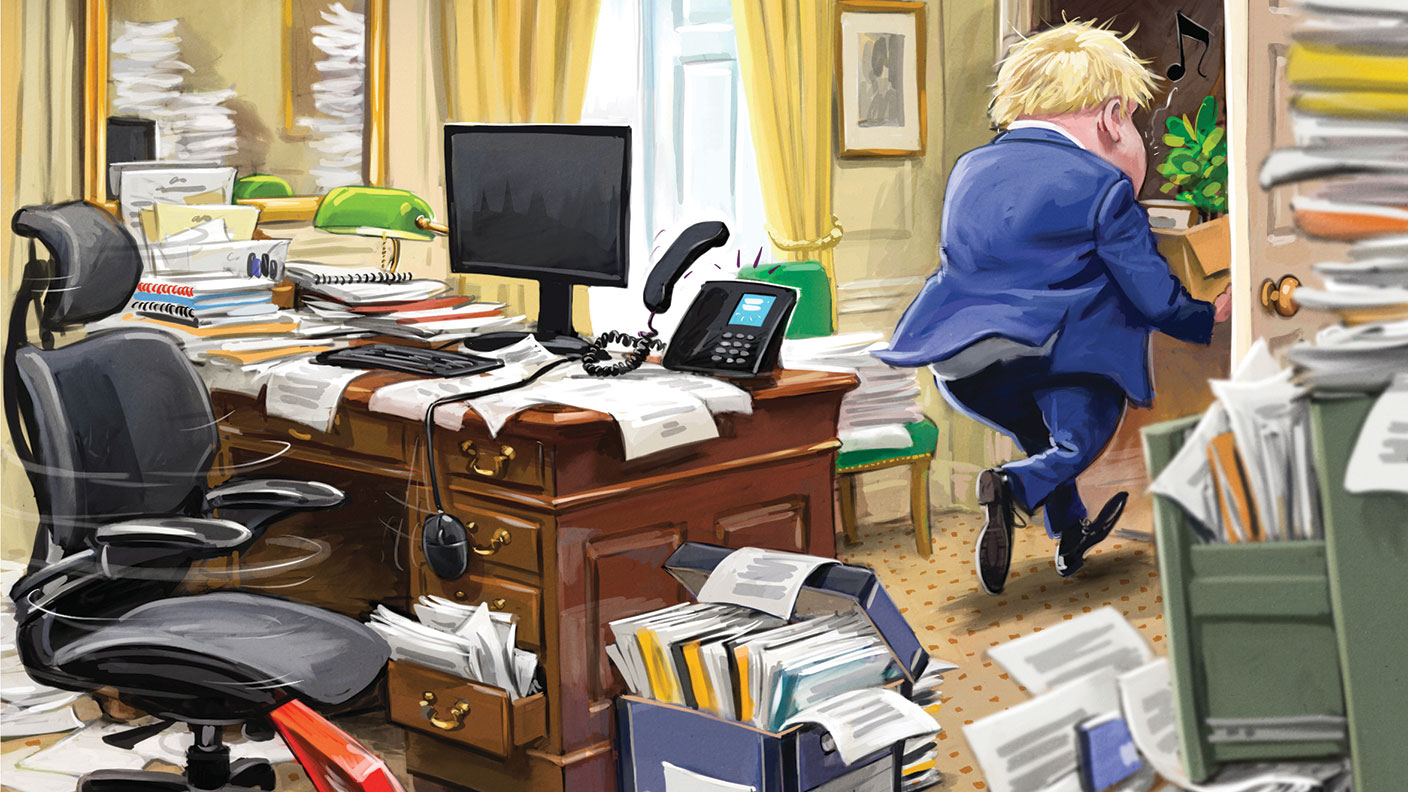Boris Johnson's exit leaves Britain with a towering in-tray
Britain’s economic problems are rapidly piling up after the last few years of drift and chaos. What should we do first?

Get the latest financial news, insights and expert analysis from our award-winning MoneyWeek team, to help you understand what really matters when it comes to your finances.
You are now subscribed
Your newsletter sign-up was successful
Want to add more newsletters?

Twice daily
MoneyWeek
Get the latest financial news, insights and expert analysis from our award-winning MoneyWeek team, to help you understand what really matters when it comes to your finances.

Four times a week
Look After My Bills
Sign up to our free money-saving newsletter, filled with the latest news and expert advice to help you find the best tips and deals for managing your bills. Start saving today!
The candidates for the Conservative leadership have been spraying around promises of tens of billions in tax cuts. In response, Conservative ex-chancellors and other grandees lined up to give the would-be new PMs a telling-off. Former chancellor Norman Lamont attacked the “Dutch auction” of unaffordable tax cuts. And William Hague said the promises would undermine the party’s “priceless reputation for disciplined economic management” – and were doubly dangerous in a prolonged period of “high inflation, a recession, or both”.
Is the UK facing a recession?
The country and its new prime minister are facing multiple serious economic challenges. Inflation is at a 40-year high and moving higher. The UK tax burden is rising from 33% of national income to a planned 36.3% in 2026-2027, according to the Office for Budget Responsibility’s spring forecasts – the highest level since the late 1940s. The public debt-to-GDP ratio is close to its highest level since the 1960s: 95%. Consumer confidence has slumped to a 50-year low amid the income squeeze. And there’s no sign of a solution to the UK’s productivity puzzle.
“Productivity growth in the years since the financial crisis has been weaker than at any time since the dawn of the industrial revolution,” notes David Smith in The Sunday Times. In the 30 years after 1945, it expanded by 3.6% a year, but has since slowed to 0.2%. Low business investment, poor infrastructure, low skills and over-centralisation are key reasons.
MoneyWeek
Subscribe to MoneyWeek today and get your first six magazine issues absolutely FREE

Sign up to Money Morning
Don't miss the latest investment and personal finances news, market analysis, plus money-saving tips with our free twice-daily newsletter
Don't miss the latest investment and personal finances news, market analysis, plus money-saving tips with our free twice-daily newsletter
The last problem was supposed to be partly rectified by “levelling up” the regions to make the UK less London-centric, but there has been scant movement on that front. Meanwhile, the OECD, an association of developed countries, expects Britain to have the slowest growth and highest inflation of any major economy next year (zero and 7.3%).
Why so grim?
Much of the developed world is suffering from higher inflation and slowing growth, with higher energy prices, supply-chain problems and labour shortages colliding with the post-pandemic surge in demand. Meanwhile, our exit from the EU’s single market has hampered trade, while inconsistent policymaking and the recent political chaos are also weighing on the pound. Sterling has fallen from $1.39 to $1.19 over the past year, despite four interest rate rises since December. In the short term, Nomura forecasts sterling at $1.10 by September, the weakest level in more than 30 years, with currency strategist Jordan Rochester even mooting sterling parity for the first time, due to the UK’s heavy reliance on dollar-denominated energy imports.
Why does that matter?
A weaker currency could help exporters, but it reflects investors’ worries about the long-term structural weakness of the UK economy. And for a country so famously dependent on the “kindness of strangers” to service our ballooning current-account deficit, a weak currency makes us even more vulnerable if sentiment changes rapidly.
The overarching task for whoever replaces Johnson – the man who responded “f**k business” when challenged over concerns about Brexit – is to offer stability, competence, and to start rebuilding trust, said Ben Wright in The Daily Telegraph.
“The tragic irony of Johnson’s premiership is that so many of his big policies were only going to work if his administration worked hand in glove with business.” Private enterprise should have been at the heart of levelling up, investing in renewable energy, creating a scientific powerhouse and forging new trade deals. Instead, it has been traduced, mocked and ignored.
The most urgent job for the new PM will be to identify “the areas in which the UK economy lacks the skills it needs, work out how to train British workers in them and issue fixed-term visas to foreign workers” to fill gaps.
Do lower taxes boost the tax take?
If fiscal policy were so magically easy, the tax rate could get ever closer to nil and the Treasury’s coffers would be overflowing. Rishi Sunak is right that “tax cuts do not pay for themselves – at least, in the short run”, says Roger Bootle in The Daily Telegraph. But they will pay off in the long run if they give an incentive to “both businesses and individuals to base themselves here and to strive for success”.
Moreover, tax cuts are only modestly inflationary, and for all the damage that sharply rising prices cause, the current bout of higher inflation can do the new PM fiscal favours: it will boost government revenues more than proportionately (especially via ex-chancellor Sunak’s frozen income-tax thresholds) and will reduce real spending. The Treasury could easily hand back this unexpected windfall without threatening fiscal stability.
So tax cuts would be a good idea?
Contrary to much media coverage, tax cuts are not some “weird Tory fixation, utterly divorced from the real-world concerns of the British people”, says Robert Colvile on CapX. The country’s number-one political issue is the cost-of-living crisis – and tackling it might just involve letting us keep more of own money. In particular, taxes on business and investment have the worst impact on long-term growth.
The planned rise in corporation tax due next spring is a huge mistake. Whoever wins, it should be scrapped. Indeed, the UK is actually an exception in tightening fiscal policy in the face of the current crisis, says economist Julian Jessop in his Charter for Tax Cuts. A looser fiscal policy (tax cuts) could actually help control inflation, both directly (for example, by cutting VAT) and indirectly (by taking some of the pressure off wage demands). Easing fiscal policy should be pursued with a tighter monetary policy: higher interest rates would help support sterling, thereby also helping to keep a lid on inflation.
Get the latest financial news, insights and expert analysis from our award-winning MoneyWeek team, to help you understand what really matters when it comes to your finances.
-
 How a ‘great view’ from your home can boost its value by 35%
How a ‘great view’ from your home can boost its value by 35%A house that comes with a picturesque backdrop could add tens of thousands of pounds to its asking price – but how does each region compare?
-
 What is a care fees annuity and how much does it cost?
What is a care fees annuity and how much does it cost?How we will be cared for in our later years – and how much we are willing to pay for it – are conversations best had as early as possible. One option to cover the cost is a care fees annuity. We look at the pros and cons.
-
 Was Margaret Thatcher great for Britain?
Was Margaret Thatcher great for Britain?The 'Iron Lady’ would be celebrating her 100th birthday this month. Margaret Thatcher rose to power in 1979 as the first ever female prime minister and was one of the most controversial leaders in history, but how did her policies shape today’s finances?
-
 UK wages grow at a record pace
UK wages grow at a record paceThe latest UK wages data will add pressure on the BoE to push interest rates even higher.
-
 Trapped in a time of zombie government
Trapped in a time of zombie governmentIt’s not just companies that are eking out an existence, says Max King. The state is in the twilight zone too.
-
 America is in deep denial over debt
America is in deep denial over debtThe downgrade in America’s credit rating was much criticised by the US government, says Alex Rankine. But was it a long time coming?
-
 UK economy avoids stagnation with surprise growth
UK economy avoids stagnation with surprise growthGross domestic product increased by 0.2% in the second quarter and by 0.5% in June
-
 Bank of England raises interest rates to 5.25%
Bank of England raises interest rates to 5.25%The Bank has hiked rates from 5% to 5.25%, marking the 14th increase in a row. We explain what it means for savers and homeowners - and whether more rate rises are on the horizon
-
 UK inflation remains at 8.7% ‒ what it means for your money
UK inflation remains at 8.7% ‒ what it means for your moneyInflation was unmoved at 8.7% in the 12 months to May. What does this ‘sticky’ rate of inflation mean for your money?
-
 Would a food price cap actually work?
Would a food price cap actually work?Analysis The government is discussing plans to cap the prices of essentials. But could this intervention do more harm than good?